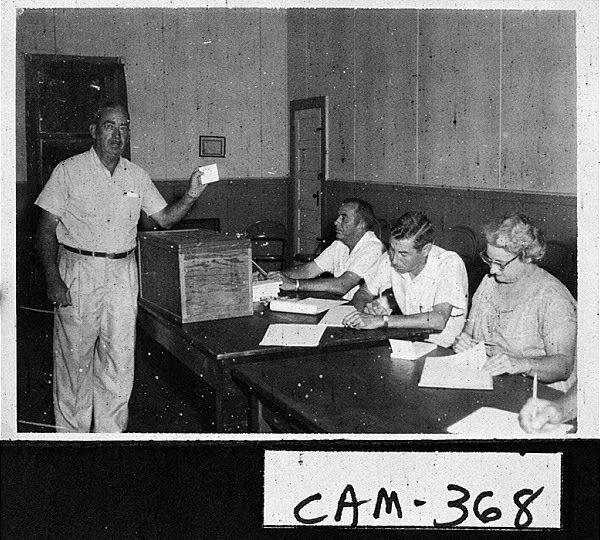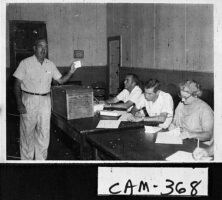Elected officers have served Georgia since the colonial era. A nineteen-member Commons House of Assembly was elected in 1755 to advise the royal governor. In colonial times the franchise, or right to vote, was quite limited; only white male property owners with significant land holdings could vote.
Over time, both the number of elective offices and the franchise were greatly expanded. Georgia is recognized as a pioneer among the states in implementing innovative electoral policies. For example, in 1943 Georgia became the first state in the nation to allow every citizen eighteen years of age and older the right to vote in local, state, and federal elections. This provision was enacted twenty-eight years before the U.S. Constitution was amended to grant the voting privilege to all eighteen-year-olds.
The Elections Division of the secretary of state’s office oversees all elections in Georgia. County registrars perform the duties of registering voters and conducting elections at the local level. In several smaller counties the judge of the probate court handles this function. At the state level it is the secretary of state’s responsibility to tabulate official returns and certify the outcome, thus pronouncing a candidate duly elected to office.
Elected Offices
The voters of Georgia elect fifteen individuals to statewide political offices: two U.S. senators; the governor; the lieutenant governor; the secretary of state; the attorney general; the state school superintendent; the commissioners of labor, agriculture, and insurance; and the five public service commissioners. The nine members of the Georgia Supreme Court and the fifteen members of the Court of Appeals of Georgia are also elected statewide.

Courtesy of Atlanta University Center, Robert W. Woodruff Library Archives.
Other offices are elected at the district level (including Georgia’s delegation to the U.S. House of Representatives and members of both houses of the General Assembly). These districts are drawn by the General Assembly every ten years after the results of the U.S. census are released. Federal guidelines require relatively equal population distribution in the drawing of all districts, but such factors as established boundaries (city and county lines), political history, and race also influence how the maps are shaped.
County and city officers (such as mayors, county commissioners, and judges) are also elected in accordance with state law. In addition, boards of directors of special and regional public authorities, such as water, waste treatment, and transportation authorities, may be elected. The number of elected officials on each council or commission varies widely. For example, in Haralson County, in the western part of the state, a single county commissioner is elected to conduct all of the county’s administration. Ten other counties also have a sole-commissioner form of government. In contrast, the consolidated governments of Athens-Clarke, Augusta-Richmond, and Columbus-Muscogee all have ten-member commissions (plus one mayor) elected by districts divided among the population of the county.
Voter Registration
Citizens may register to vote by mail through the secretary of state’s office or at a public service facility such as a board of elections office, library, Division of Family and Children Services office, armed services recruitment office, or driver’s licensing authority.
Voters in Georgia must be citizens of the United States, legal residents of the counties in which they seek to register, and eighteen years old by the day of the election; they must also apply for registration thirty days before an upcoming election. Those serving sentences following conviction for a felony or those who have been declared mentally incompetent are not eligible to vote.
For a century after the Civil War (1861-65), voter registration in Georgia was a difficult and time-consuming process. Due to state constitutional restrictions designed to keep African Americans from voting, citizens who wanted to register were required to go before a board of registrars to prove residence and demonstrate literacy. White citizens were usually exempt from these sorts of restrictions and some of the restrictions, like the literacy test, were designed to be impossible to pass. After the U.S. Congress passed the 1965 Voting Rights Act, restrictions targeting racial minorities were lifted. Nonetheless, it was still relatively difficult to register to vote in Georgia until the 1980s, when additional offices were given the authority to register voters and the General Assembly passed legislation allowing voter registration drives by private interest groups and even candidates for public office themselves. The passage of federal legislation known as the Motor-Voter Act also made it easier to register to vote in Georgia as well as in the rest of the nation.

Photograph by Wikimedia
Voting Technology
After the 2000 presidential elections, when difficulties emerged in determining the winner of Florida’s electoral votes, Georgia’s secretary of state, Cathy Cox, announced that she would seek funding to install uniform voting machinery around the state of Georgia. As a result of Cox’s initiative, Georgia became the first state in the nation to employ a touch-screen voting system statewide.

Courtesy of Georgia Archives.
In March 2019, the General Assembly approved a new touch-screen and paper-ballot voting system. These ballot-marking devices are likewise touch-screen, but also produce a paper ballot that voters can review before scanning their votes to be counted. Proponents argue that the new machines provide increased accessibility options and a paper record for easy verification, but opponents maintain the system would leave Georgia’s elections vulnerable to hacking.








